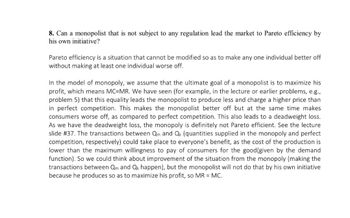
ENGR.ECONOMIC ANALYSIS
14th Edition
ISBN: 9780190931919
Author: NEWNAN
Publisher: Oxford University Press
expand_more
expand_more
format_list_bulleted
Question

Transcribed Image Text:8. Can a monopolist that is not subject to any regulation lead the market to Pareto efficiency by
his own initiative?
Pareto efficiency is a situation that cannot be modified so as to make any one individual better off
without making at least one individual worse off.
In the model of monopoly, we assume that the ultimate goal of a monopolist is to maximize his
profit, which means MC-MR. We have seen (for example, in the lecture or earlier problems, e.g.,
problem 5) that this equality leads the monopolist to produce less and charge a higher price than
in perfect competition. This makes the monopolist better off but at the same time makes
consumers worse off, as compared to perfect competition. This also leads to a deadweight loss.
As we have the deadweight loss, the monopoly is definitely not Pareto efficient. See the lecture
slide # 37. The transactions between Qm and Qk (quantities supplied in the monopoly and perfect
competition, respectively) could take place to everyone's benefit, as the cost of the production is
lower than the maximum willingness to pay of consumers for the good (given by the demand
function). So we could think about improvement of the situation from the monopoly (making the
transactions between Qm and Qk happen), but the monopolist will not do that by his own initiative
because he produces so as to maximize his profit, so MR = MC.
Expert Solution
This question has been solved!
Explore an expertly crafted, step-by-step solution for a thorough understanding of key concepts.
Step by stepSolved in 2 steps with 3 images

Knowledge Booster
Similar questions
- 5. Use the following figure to answer the question: If the monopolist charges the same price to all consumers, what will be the deadweight loss at the monopolist’s profit maximizing level of output?arrow_forwardPlease see the attached40arrow_forwardplease show me complete and neat solution thank youarrow_forward
- The accompanying graph depicts the marginal revenue (MR), demand (D), and marginal cost (MC) curves for a monopoly a. Place point Pi at the profit maximizing price and quantitvy assuming that the monopolist can only charge a single price. 100 95 90 85 80 75 70 65 2 60 b. What are the profits of the firm if it charges a single price? 50 45 Suppose the monopolist able to successfully price discriminate between two groups by charging one group $60 and charging $35 to the other group. c. What are the firm's profits if it charges the two prices as mentioned above? 35 30 25 20 15 10 MR 0 5 10 15 20 25 30 35 40 45 50 55 60 65 70 75 80 85 90 95100 Quantityarrow_forward5. Imagine a monopolist could charge a different price to every customer based on how much he or she was willing to pay. How would this affect monopoly profits?arrow_forwardWhat is the firm's profit?arrow_forward
- Hello, I need help with this Econ question. I saw that these questions are already answered in bartlebyarrow_forwardExplain whether the following sentence makes Good Economic Sense: “The way to tell if a business has monopoly power is to count the number of substitutes for that business’s product.”arrow_forwardReview the graph at right for a monopoly market (enter all of your responses as whole numbers). Price 100- How much is the consumer surplus? S 90- MC How much is the producer surplus? s 80- 70- How much is the deadweight loss? S 60 80- Monopoly total surplus is $ 50- Monopoly total surplus is V competitive total surplus. 40- 30- 20- 10- MR D 10 30 40 50 60 70 90 100 Quantityarrow_forward
arrow_back_ios
SEE MORE QUESTIONS
arrow_forward_ios
Recommended textbooks for you

 Principles of Economics (12th Edition)EconomicsISBN:9780134078779Author:Karl E. Case, Ray C. Fair, Sharon E. OsterPublisher:PEARSON
Principles of Economics (12th Edition)EconomicsISBN:9780134078779Author:Karl E. Case, Ray C. Fair, Sharon E. OsterPublisher:PEARSON Engineering Economy (17th Edition)EconomicsISBN:9780134870069Author:William G. Sullivan, Elin M. Wicks, C. Patrick KoellingPublisher:PEARSON
Engineering Economy (17th Edition)EconomicsISBN:9780134870069Author:William G. Sullivan, Elin M. Wicks, C. Patrick KoellingPublisher:PEARSON Principles of Economics (MindTap Course List)EconomicsISBN:9781305585126Author:N. Gregory MankiwPublisher:Cengage Learning
Principles of Economics (MindTap Course List)EconomicsISBN:9781305585126Author:N. Gregory MankiwPublisher:Cengage Learning Managerial Economics: A Problem Solving ApproachEconomicsISBN:9781337106665Author:Luke M. Froeb, Brian T. McCann, Michael R. Ward, Mike ShorPublisher:Cengage Learning
Managerial Economics: A Problem Solving ApproachEconomicsISBN:9781337106665Author:Luke M. Froeb, Brian T. McCann, Michael R. Ward, Mike ShorPublisher:Cengage Learning Managerial Economics & Business Strategy (Mcgraw-...EconomicsISBN:9781259290619Author:Michael Baye, Jeff PrincePublisher:McGraw-Hill Education
Managerial Economics & Business Strategy (Mcgraw-...EconomicsISBN:9781259290619Author:Michael Baye, Jeff PrincePublisher:McGraw-Hill Education


Principles of Economics (12th Edition)
Economics
ISBN:9780134078779
Author:Karl E. Case, Ray C. Fair, Sharon E. Oster
Publisher:PEARSON

Engineering Economy (17th Edition)
Economics
ISBN:9780134870069
Author:William G. Sullivan, Elin M. Wicks, C. Patrick Koelling
Publisher:PEARSON

Principles of Economics (MindTap Course List)
Economics
ISBN:9781305585126
Author:N. Gregory Mankiw
Publisher:Cengage Learning

Managerial Economics: A Problem Solving Approach
Economics
ISBN:9781337106665
Author:Luke M. Froeb, Brian T. McCann, Michael R. Ward, Mike Shor
Publisher:Cengage Learning

Managerial Economics & Business Strategy (Mcgraw-...
Economics
ISBN:9781259290619
Author:Michael Baye, Jeff Prince
Publisher:McGraw-Hill Education